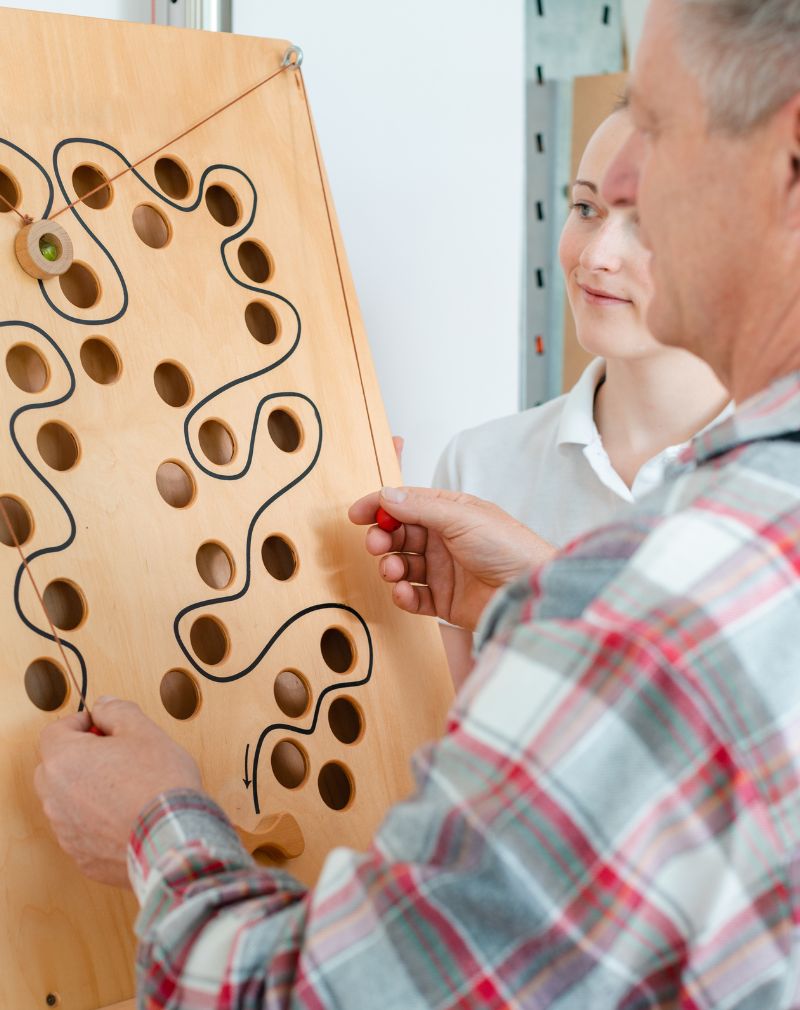You wake up tired. Not because you didn’t sleep, but because your mind never really shut off. You delay that task again, then feel guilty all day. You reach for your phone before you’ve even spoken to anyone.
These aren’t personality flaws. They’re patterns. Quiet behaviors that slip into your routine and start shaping your life without asking permission.
Occupational therapy helps when the structure is gone. It’s not just for recovery after surgery or injury. It’s for adults who feel mentally foggy, emotionally drained, or simply out of sync with their own lives.
When your routines fall apart, everything feels heavier. Work, relationships, health, sleep, all starts to spiral. And most people wait too long to do something about it.
At The American Wellness Center in Dubai Healthcare City, our Occupational Therapy Team works with adults to break these cycles. We don’t lecture or judge. We help you build better habits, one step at a time.
What Is Behavioral Modification in Occupational Therapy?
Most habits don’t feel like a choice. You don’t decide to scroll endlessly or skip meals. You just do it until it becomes automatic.
Behavioral modification is about disrupting that autopilot. It’s a structured approach used by occupational therapists to help adults replace unhealthy habits with healthier, more functional ones.
At its core, it answers one question:
Why do you keep doing what hurts you, even when you know better?
It’s not just willpower. It’s behavior loops; trigger, action, reward. Occupational therapy helps break those loops by changing what you do, how you react, and what you expect in return.
Who Is This For?
Behavioral therapy isn’t just for people in crisis. It’s for anyone who’s tired of feeling stuck in patterns they don’t like.
We commonly see adults struggling with:
- Overwhelm and disorganization that make simple tasks feel impossible
- Fatigue that leads to skipped meals, skipped meds, skipped everything
- Delayed routines after surgery, injury, or illness
- Emotional eating, stress scrolling, or constantly avoiding hard tasks
- Anxiety-driven habits like pacing, nail biting, or compulsive checking
You don’t need a diagnosis to get help. You just need to notice that your day feels harder than it should.
What Changes After Behavioral OT?
Progress doesn’t come all at once. It comes in moments. You wake up and don’t reach for your phone.
You eat before 2 p.m. for the first time in a week. You stick to a morning plan and actually feel better after it.
These shifts may seem small, but they stack up fast. And over time, they change how you live.
The Numbers Behind the Change
- Even though behavioral OT doesn’t make headlines, the results speak clearly:
- 52% of adults in behavioral-based OT programs report better adherence to daily routines within six weeks
- Patients who use habit-tracking tools alongside therapy are 60% more likely to maintain their routines over 3+ months
- Clinics across Dubai report a growing demand for adult-focused behavioral OT, especially post-COVID and in hybrid work setups
- Over 70% of therapy plans at The American Wellness Center now integrate behavioral coaching as part of long-term recovery
You don’t need to hit rock bottom. You just need a place to start.
How Occupational Therapists Help Adults Change Habits
Most adults don’t need someone to tell them what’s wrong.
They need someone to help them do something about it.
Occupational therapists don’t just hand out advice. They work with you to rebuild structure from the ground up.
Bit by bit, pattern by pattern.
Here’s what that process often looks like:
- Planning with purpose: Setting real goals, not vague hopes. Short-term, doable, and aligned with how your life actually works.
- Scheduling with flexibility: Rebuilding daily routines that account for your energy, your work, and your setbacks.
- Tracking behavior: Using simple tools—apps, logs, voice prompts—to keep habits visible. What you track, you change.
- Facing what you avoid: Slowly reintroducing the tasks or settings that trigger stress or anxiety, in a controlled, supported way.
- Self-monitoring: Learning how to notice when you’re off-track without spiraling into shame.
The goal isn’t perfection. It’s progress that lasts.
Life Areas It Can Impact
This work doesn’t stay inside the therapy room.
It spreads into your mornings, your workdays, your home life.
Where behavioral therapy lands hardest:
Work
- Missing deadlines, losing focus, avoiding emails
- Getting through the day on adrenaline, then crashing
Home
- Cluttered spaces and chaotic routines
- Meals skipped, chores delayed, everything feeling late
Health
- Poor sleep, no exercise, inconsistent meds
- Habits that make your body feel worse, not better
Mental Well-being
- Constant reactivity, mood swings, decision fatigue
- Living in “survival mode” instead of feeling grounded
You don’t need to fix everything at once. But you can stop watching it all fall apart.
New Tools and Techniques in 2025
Technology hasn’t replaced therapy. But it’s made it smarter.
Occupational therapists now use tools that fit into your daily life, not interrupt it:
- AI-based behavior trackers
These are being tailored to help adults recovering from trauma or navigating neurodiversity. They offer real-time feedback and reminders that don’t overwhelm. - Smart home reminders
Simple voice prompts or timed lighting changes that support daily routines without screens. - Wearables for habit cues
Devices that track movement, rest, and even posture—building awareness passively. - Virtual sessions and hybrid care
Roughly 62% of occupational therapy programs now include digital support. That means easier access and better follow-up for working adults.
Change is no longer just in-session. It’s built into your day.
Where Children Come In
Pediatric therapy often gets the spotlight, but adults are the fastest-growing group in behavioral OT.
And for good reason.
Many parents of neurodiverse children start therapy for their kids; then realize they need it too.
When you start changing your own behavior, your home changes with you.
That ripple effect is real.
The American Wellness Center Approach
At The American Wellness Center in Dubai Healthcare City, our Occupational Therapy team focuses on real-life change. Not worksheets. Not lectures. Real habits, real support.
Here’s how we work:
- One-on-one behavioral therapy based on what you actually need
- Integrated care with psychologists, physical therapists, and rehab professionals
- Flexible routines built around your energy and environment
- Support for adults who work, care for others, or simply want better
Our approach is grounded, practical, and personal.
Because the smallest habit you change might be the one that changes everything.
When You’re Ready to Live Differently
You don’t need another motivational quote. You need a plan that fits your life and someone to walk you through it.
Behavioral therapy isn’t about fixing you. It’s about helping you unlearn the habits that are holding you back and replacing them with ones that actually support the life you want.
The change is slow, but it sticks. It builds quietly, until one day, you look back and realize: you’re not in survival mode anymore.
You’re steady. Present. Capable. And no, you didn’t do it alone.
At The American Wellness Center in Dubai Healthcare City, our Occupational Therapy team works with adults who are done repeating the same cycles. We help you make small, realistic changes that add up. Because this isn’t about quick fixes. It’s about building a life that finally feels like yours. Contact us Today!



